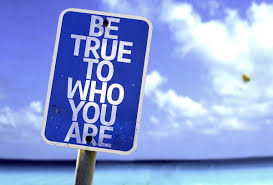One of my favourite things of saying to clients during sessions is ‘If you are not you, who will be?’
Often we struggle with allowing ourselves to be ourselves. Does that sound silly? It should be the easiest most natural thing to do. Be yourself. But it isn’t :=(
There have been studies on the ‘meaning in life’ in which researchers asked students to write about their ‘true self’ and about ‘who you believe you really are.’
Another group of students was asked to write about their “everyday self” as defined by how they actually behave in their daily life. And a third group of students was asked to write about the campus bookshop. After the writing task, the students were then asked to rate their meaning in life.
 Schlegel’s empirical research backs up what existentialist philosophers like Jean-Paul Sartre and great humanistic psychologists like Carl Rogers and Abraham Maslow proposed decades ago: There is inherent value in being able to live authentically and express oneself. It makes our lives feel truly worth living.
Schlegel’s empirical research backs up what existentialist philosophers like Jean-Paul Sartre and great humanistic psychologists like Carl Rogers and Abraham Maslow proposed decades ago: There is inherent value in being able to live authentically and express oneself. It makes our lives feel truly worth living.
 This theoretical insight is backed up by recent research within self-determination theory. This has argued forcefully that autonomy is a fundamental human need. The satisfaction of this vitally important for our psychological growth, integrity and well-being. Just as our body needs food and water for its wellness and health, our mind needs a few basic psychosocial experiences for its wellness and health—and among these needs autonomy stands tall. As self-determination theory is currently the most studied theory of motivation within psychology, there are literally hundreds of studies demonstrating the importance of autonomy for human well-being in various areas of life ranging from educational outcomes and work engagement to sport performance and dental hygiene. Yep, the health of your teeth can depend on how meaningful your life is to you.
This theoretical insight is backed up by recent research within self-determination theory. This has argued forcefully that autonomy is a fundamental human need. The satisfaction of this vitally important for our psychological growth, integrity and well-being. Just as our body needs food and water for its wellness and health, our mind needs a few basic psychosocial experiences for its wellness and health—and among these needs autonomy stands tall. As self-determination theory is currently the most studied theory of motivation within psychology, there are literally hundreds of studies demonstrating the importance of autonomy for human well-being in various areas of life ranging from educational outcomes and work engagement to sport performance and dental hygiene. Yep, the health of your teeth can depend on how meaningful your life is to you.
 Given that the need for autonomy is built into the human motivational system, it is no wonder we find something inherently worthy and fulfilling in being able to live authentically. Basic psychological needs provide a robust foundation for where to find meaning in life. And what applies to whole lives is true also for individual tasks. Hong Zhang from Nanjing University demonstrated that how much autonomy people perceive in trying to achieve goals is connected to how meaningful they experienced the goal to be. It’s logical then that having autonomy at work is one of the key qualities that makes work meaningful.
Given that the need for autonomy is built into the human motivational system, it is no wonder we find something inherently worthy and fulfilling in being able to live authentically. Basic psychological needs provide a robust foundation for where to find meaning in life. And what applies to whole lives is true also for individual tasks. Hong Zhang from Nanjing University demonstrated that how much autonomy people perceive in trying to achieve goals is connected to how meaningful they experienced the goal to be. It’s logical then that having autonomy at work is one of the key qualities that makes work meaningful.
In order to live a meaningful life, then, make sure you are in touch with yourself—that you are living a life endorsed by yourself, not a life aiming at pleasing others. If you don’t follow your own values and dreams, you are most probably following values set by others. And there is nothing more disappointing in life than living someone else’s dream. As some Oscar Wilde wrote ‘Be yourself; everyone else is already taken.’
Meaningfulness is about connection. While this means that a major part of the meaningfulness in our lives comes from connecting with others through intimate, caring relationships and through being able to contribute to society and those one cares about, you cannot connect with others unless you are first in contact with yourself. Otherwise it is not you who is connecting to others but just an empty shell. Only by knowing who you are and where you come from, can you start to authentically connect with others.
Autonomy is about being the author of your own life: making conscious choices to live according to your own preferences, engage in activities you find personally interesting and that express who you are, and pursue goals you find worthy. And therein lies a recipe for more meaningful living.
 So, can I be a bit bossy and give you some homework? ;=)
So, can I be a bit bossy and give you some homework? ;=)
Take a moment today to write about your true self and who you believe you really are as a person. Write about what your most important values are, and what you yourself would like to pursue and have in life.
Then start to figure out how could you make that true self more the self that you show in your everyday life and work.
References
Rebecca J. Schiegel et al.
Feeling Like You Know Who You Are: Perceived True Self-Knowledge and Meaning in Life
Personality and Social Psychology Bulletin 2011, 37(6):745-56
DOI: 10.1177/0146167211400424
Frank Martela
A Wonderful Life: Insights on Finding a Meaningful Existence.
Published by Harper Design, 2020.
